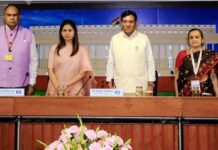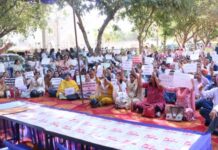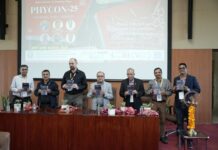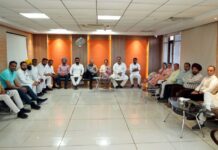INDIAN RHEUMATOLOGY ASSOCIATION (IRA)ssA DECLARED APRIL AS RHEUMATOLOGICAL DISEASES AWARENESS MONTH
“Rheumatological Diseases are often neglected and assumed to be part of the aging process. They are not considered as diseases which are treatable. These diseases not only affect day-to-day life but shortens the life expectancy and quality of life. Having a painful disease erodes the confidence of the person who suffers from it. The rheumatological diseases are not new, but the speciality “rheumatology” is not familiar to many. This leads to underutilisation of the speciality both in public and private hospitals. Policy makers are also not fully aware of the burden of Rheumatic diseases and Rheumatology as a standalone speciality. In addition, rheumatological diseases are shrouded by a lot of myths and misconceptions. The recent advances in the management of these diseases have improved the quality of life for these patients tremendously. This information has not percolated to the general doctors and public. This has caused lots of misery and suffering to the patients with rheumatic diseases. Often they don’t seek help at the appropriate time and suffer from damage due to the delay. With the primary objective to sensitise the general public, on the rheumatology related diseases, role of Rheumatologists as the specialist doctors who care for these diseases and to clear the misconception on rheumatological diseases, we are organising various public activities”, stated Prof. (Dr.) Aman Sharma, Secretary, IRA.
Medical Speciality of Rheumatology is primarily involved in diagnosing and treating patients with Rheumatological diseases, relieving the pain and other symptoms of the patients and enhancing their life span, quality of life, and productivity and hence reducing the social burden. In India, currently we have a limited number of institutions that have both teaching and non-teaching rheumatology departments. Even with modest estimation of 2.5% of population suffering from these dreadful rheumatic diseases, we should have the specialized department, at least 2 or 3 for every district.
The broad classification of Inflammatory Rheumatological Diseases includes Rheumatoid Arthritis, Ankylosing spondylitis, Systemic Lupus Erythematosus, Psoriatic Arthritis and several other diseases which are often vaguely categorized as chronic arthritis. Many rheumatological diseases are also life threatening and affect multiple organs like lungs, heart and kidneys. All together, these diseases affect 2-3% of Indian population. Hence the impact of disease-related disabilities is substantial. These diseases can affect any age group including the younger and middle- aged population.
These diseases are mostly autoimmune diseases where our own immune system attacks our own body parts. This can result in varied manifestations affecting any part of the body from head to toe.
Women are affected much more than men. If the lady of the house is affected by chronic rheumatological disease, entire family suffers particularly children. In contrast to non-communicable diseases like diabetes and cancer, disabilities and socioeconomic burden associated with Rheumatological diseases cause devastating effects on patients and their families. If the disease is not properly diagnosed and managed early, it may cause severe deformities and disabilities, reduced life expectancy, increased out-of-pocket expenditures, loss of working hours and reduced productivity. The disease is cripplingly painful and causes significant interference in day-to-day activities, and the patient may face social isolation and even job termination.
Therapeutic advances and understanding the pathogenesis of inflammatory Rheumatological diseases have contributed to improved treatment outcomes. The policy to cover this rheumatic disease by third party payers (Insurance) to date remain unscientific, biased and archaic. Majority of them are categorized as chronic and non-treatable. Hence, the current practices in insurance and health care delivery provisions in India have excluded them reimbursement benefits, which are provided by majority of the third-party payers abroad. The exclusion of rheumatic disease is also noticed in schemes for people belonging to below poverty line like Arogya Bhagya, Yashaswini, Bhamasha, Ayushman etc. Since these illnesses are being classified as ‘chronic illnesses’, they are excluded from reimbursement benefits. These reimbursement guidelines, formulated many decades ago, need a total revamp considering the recent revolutionary therapeutic and management strategies.
In order to raise the awareness regarding rheumatological diseases, the availability of newer cost-effective treatment for these diseases and also to raise the awareness on policy revision, Indian Rheumatology Association is organizing several educative programmes throughout the month of April 2022 throughout the country
OBJECTIVE OF THE PROGRAMME:
Increasing the awareness that the pain and suffering of the patients of Rheumatological Diseases are treatable.
Rheumatology is the speciality which specialises in diagnosing and treating Rheumatological diseases.
Achieving timely diagnosis and optimal treatment are the goals. To emphasize the need of policy revision to make inflammatory
Rheumatological Diseases (including Rheumatoid Arthritis, Ankylosing Spondylitis, Systemic Lupus Erythematosus and Psoriatic Arthritis) are insurable and reimbursable, and also to include them under govt. sponsored schemes.












